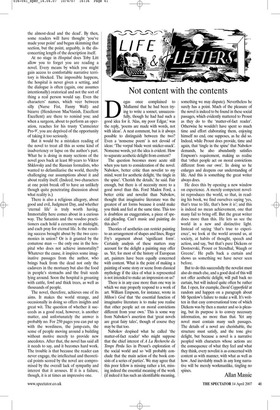Not content with the contents
Degas once complained to Mallarmé that he had been trying to write a sonnet, unsuccessfully, though he had had such a good idea for it. ‘Alas, my poor Edgar,’ was the reply, ‘poems are made with words, not with ideas’. A neat comment, but is it always possible to distinguish between the two? Even a ‘nonsense poem’ is not devoid of ideas: ‘The vorpal blade went snicker-snack’. Nonsense words, yet the idea is evident. How to separate aesthetic delight from content?
The question becomes more acute still when you turn to consideration of the novel. Nabokov, better critic than novelist to my mind, went for aesthetic delight, ‘the tingle in the spine’. ‘Cherish the details,’ he said. Fair enough, but there is of necessity more to a good novel than this. Ford Madox Ford, a better critic and novelist than Nabokov, thought that imaginative literature was the greatest of art forms because it could make you think and feel at the same time. This too is doubtless an exaggeration, a piece of special pleading. Can’t music and painting do this also?
Theories of aesthetics can restrict painting to an arrangement of shapes and lines, Roger Fry’s argument about ‘significant form’. Certainly analysis of these matters may account for the delight a painting may offer us. Yet, for most of the history of European art, painters have been equally concerned with content. What is the point of making a painting of some story or scene from classical mythology if the idea of what is represented is not intended to make an impression on us?
There is in any case more than one way in which we may properly respond to a work of art. William Empsom, for instance, wrote in Milton’s God that ‘the essential function of imaginative literature is to make you realise that other people act on moral convictions different from your own.’ This is some way from Nabokov’s assertion that ‘great novels are great fairy tales’, though of course they may be that too.
Nabokov despised what he called ‘the matter-of-fact reader’ who might suppose that the chief interest of A La Recherche du Temps Perdu lies in Proust’s exploration of the social world and so ‘will probably conclude that the main action of the book consists of a series of parties’. We may agree that this poor fellow is missing rather a lot, missing indeed the essential meaning of the work (if indeed it has such an identifiable meaning, something we may dispute). Nevertheless he surely has a point. Much of the pleasure of the novel is indeed to be found in these social passages, which evidently mattered to Proust as they do to the ‘matter-of-fact reader’. Otherwise he wouldn’t have spent so much time and effort elaborating them, enjoying himself no end, one supposes, as he did so. Indeed, while Proust does provide, time and again, that ‘tingle in the spine’ that Nabokov demands, he also abundantly satisfies Empsom’s requirement, making us realise that ‘other people act on moral convictions different from our own’. In doing so he enlarges and deepens our understanding of life. And this is something the great writer always does.
He does this by opening a new window on experience. A merely competent novelist reproduces the world, so that, in reading his book, we find ourselves saying ‘yes, that’s true to life, that’s how it is’; and this is indeed no mean achievement, one that many fail to bring off. But the great writer does more than this. He lets us see the world in a new and distinctive light. Instead of saying ‘that’s true to experience’, we look at the world around us, at society, at habits of thought, speech and action, and say, ‘but that’s pure Dickens or Dostoevski, Proust or Stendhal, Waugh or Greene’. He pulls back a curtain and shows us something we have never seen before.
But to do this successfully the novelist must also do much else, and a good deal of this will not offer aesthetic delight, will pull back no curtain, but will indeed quite often be rather flat. I open, for example, David Copperfield at random and happen on a paragraph about Mr Spenlow’s failure to make a will. It’s written in that easy conversational tone of which Dickens was by then a master and so is pleasing, but its purpose is to convey necessary information, no more than that. Yet any novel must contain many such passages. The details of a novel are cherishable, the structure must satisfy, and the tone give delight, but because a novel is a narrative peopled with characters whose actions are the consequence of what they feel and what they think, every novelist is as concerned with content as with manner, with what as well as how. And inevitably much in any long narrative will be merely workmanlike, tingling no spines.
Allan Massie


































































 Previous page
Previous page